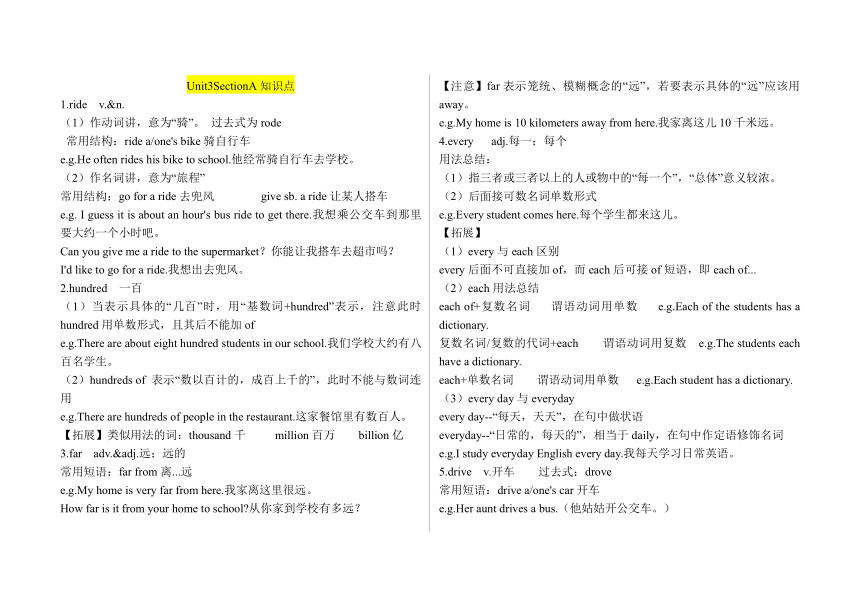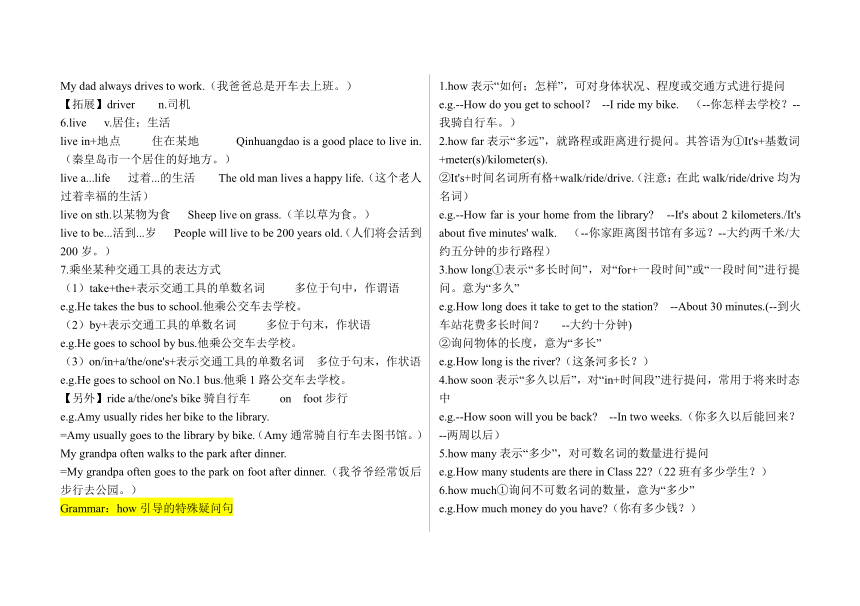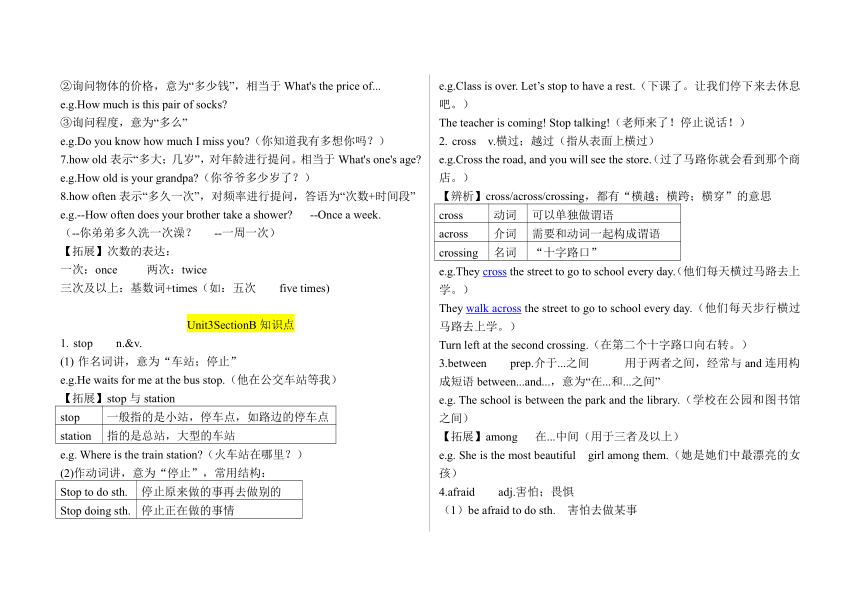Unit 3 How do you get to school? 知识点大汇总
文档属性
| 名称 | Unit 3 How do you get to school? 知识点大汇总 |  | |
| 格式 | docx | ||
| 文件大小 | 30.1KB | ||
| 资源类型 | 教案 | ||
| 版本资源 | 人教新目标(Go for it)版 | ||
| 科目 | 英语 | ||
| 更新时间 | 2023-11-03 17:35:44 | ||
图片预览



文档简介
Unit3SectionA知识点
1.ride v.&n.
(1)作动词讲,意为“骑”。 过去式为rode
常用结构:ride a/one's bike骑自行车
e.g.He often rides his bike to school.他经常骑自行车去学校。
(2)作名词讲,意为“旅程”
常用结构:go for a ride去兜风 give sb. a ride让某人搭车
e.g. I guess it is about an hour's bus ride to get there.我想乘公交车到那里要大约一个小时吧。
Can you give me a ride to the supermarket?你能让我搭车去超市吗?
I'd like to go for a ride.我想出去兜风。
2.hundred 一百
(1)当表示具体的“几百”时,用“基数词+hundred”表示,注意此时hundred用单数形式,且其后不能加of
e.g.There are about eight hundred students in our school.我们学校大约有八百名学生。
(2)hundreds of 表示“数以百计的,成百上千的”,此时不能与数词连用
e.g.There are hundreds of people in the restaurant.这家餐馆里有数百人。
【拓展】类似用法的词:thousand千 million百万 billion亿
3.far adv.&adj.远;远的
常用短语:far from离...远
e.g.My home is very far from here.我家离这里很远。
How far is it from your home to school 从你家到学校有多远?
【注意】far表示笼统、模糊概念的“远”,若要表示具体的“远”应该用away。
e.g.My home is 10 kilometers away from here.我家离这儿10千米远。
4.every adj.每一;每个
用法总结:
(1)指三者或三者以上的人或物中的“每一个”,“总体”意义较浓。
(2)后面接可数名词单数形式
e.g.Every student comes here.每个学生都来这儿。
【拓展】
(1)every与each区别
every后面不可直接加of,而each后可接of短语,即each of...
(2)each用法总结
each of+复数名词 谓语动词用单数 e.g.Each of the students has a dictionary.
复数名词/复数的代词+each 谓语动词用复数 e.g.The students each have a dictionary.
each+单数名词 谓语动词用单数 e.g.Each student has a dictionary.
(3)every day与everyday
every day--“每天,天天”,在句中做状语
everyday--“日常的,每天的”,相当于daily,在句中作定语修饰名词
e.g.I study everyday English every day.我每天学习日常英语。
5.drive v.开车 过去式:drove
常用短语:drive a/one's car开车
e.g.Her aunt drives a bus.(他姑姑开公交车。)
My dad always drives to work.(我爸爸总是开车去上班。)
【拓展】driver n.司机
6.live v.居住;生活
live in+地点 住在某地 Qinhuangdao is a good place to live in.(秦皇岛市一个居住的好地方。)
live a...life 过着...的生活 The old man lives a happy life.(这个老人过着幸福的生活)
live on sth.以某物为食 Sheep live on grass.(羊以草为食。)
live to be...活到...岁 People will live to be 200 years old.(人们将会活到200岁。)
7.乘坐某种交通工具的表达方式
(1)take+the+表示交通工具的单数名词 多位于句中,作谓语
e.g.He takes the bus to school.他乘公交车去学校。
(2)by+表示交通工具的单数名词 多位于句末,作状语
e.g.He goes to school by bus.他乘公交车去学校。
(3)on/in+a/the/one's+表示交通工具的单数名词 多位于句末,作状语
e.g.He goes to school on No.1 bus.他乘1路公交车去学校。
【另外】ride a/the/one's bike骑自行车 on foot步行
e.g.Amy usually rides her bike to the library.
=Amy usually goes to the library by bike.(Amy通常骑自行车去图书馆。)
My grandpa often walks to the park after dinner.
=My grandpa often goes to the park on foot after dinner.(我爷爷经常饭后步行去公园。)
Grammar:how引导的特殊疑问句
1.how表示“如何;怎样”,可对身体状况、程度或交通方式进行提问
e.g.--How do you get to school? --I ride my bike. (--你怎样去学校?--我骑自行车。)
2.how far表示“多远”,就路程或距离进行提问。其答语为①It's+基数词+meter(s)/kilometer(s).
②It's+时间名词所有格+walk/ride/drive.(注意:在此walk/ride/drive均为名词)
e.g.--How far is your home from the library --It's about 2 kilometers./It's about five minutes' walk. (--你家距离图书馆有多远?--大约两千米/大约五分钟的步行路程)
3.how long①表示“多长时间”,对“for+一段时间”或“一段时间”进行提问。意为“多久”
e.g.How long does it take to get to the station --About 30 minutes.(--到火车站花费多长时间? --大约十分钟)
②询问物体的长度,意为“多长”
e.g.How long is the river (这条河多长?)
4.how soon表示“多久以后”,对“in+时间段”进行提问,常用于将来时态中
e.g.--How soon will you be back --In two weeks.(你多久以后能回来? --两周以后)
5.how many表示“多少”,对可数名词的数量进行提问
e.g.How many students are there in Class 22 (22班有多少学生?)
6.how much①询问不可数名词的数量,意为“多少”
e.g.How much money do you have (你有多少钱?)
②询问物体的价格,意为“多少钱”,相当于What's the price of...
e.g.How much is this pair of socks
③询问程度,意为“多么”
e.g.Do you know how much I miss you (你知道我有多想你吗?)
7.how old表示“多大;几岁”,对年龄进行提问。相当于What's one's age
e.g.How old is your grandpa (你爷爷多少岁了?)
8.how often表示“多久一次”,对频率进行提问,答语为“次数+时间段”
e.g.--How often does your brother take a shower --Once a week.
(--你弟弟多久洗一次澡? --一周一次)
【拓展】次数的表达:
一次:once 两次:twice
三次及以上:基数词+times(如:五次 five times)
Unit3SectionB知识点
stop n.&v.
作名词讲,意为“车站;停止”
e.g.He waits for me at the bus stop.(他在公交车站等我)
【拓展】stop与station
stop 一般指的是小站,停车点,如路边的停车点
station 指的是总站,大型的车站
e.g. Where is the train station (火车站在哪里?)
(2)作动词讲,意为“停止”,常用结构:
Stop to do sth. 停止原来做的事再去做别的
Stop doing sth. 停止正在做的事情
e.g.Class is over. Let’s stop to have a rest.(下课了。让我们停下来去休息吧。)
The teacher is coming! Stop talking!(老师来了!停止说话!)
cross v.横过;越过(指从表面上横过)
e.g.Cross the road, and you will see the store.(过了马路你就会看到那个商店。)
【辨析】cross/across/crossing,都有“横越;横跨;横穿”的意思
cross 动词 可以单独做谓语
across 介词 需要和动词一起构成谓语
crossing 名词 “十字路口”
e.g.They cross the street to go to school every day.(他们每天横过马路去上学。)
They walk across the street to go to school every day.(他们每天步行横过马路去上学。)
Turn left at the second crossing.(在第二个十字路口向右转。)
3.between prep.介于...之间 用于两者之间,经常与and连用构成短语between...and...,意为“在...和...之间”
e.g. The school is between the park and the library.(学校在公园和图书馆之间)
【拓展】among 在...中间(用于三者及以上)
e.g. She is the most beautiful girl among them.(她是她们中最漂亮的女孩)
4.afraid adj.害怕;畏惧
(1)be afraid to do sth. 害怕去做某事
e.g.Don't be afraid to ask others for help.(不要害怕向其他人寻求帮助)
(2)be afraid of doing sth. 害怕做某事
e.g.He is afraid of going out by himself at night.(他害怕自己晚上出去)
(3)be afraid+(that)从句 恐怕...
e.g.I'm afraid (that) I can't go with you.(恐怕我不能和你一起去)
【例题】(山东东营)
Elder brother: Which is much braver, the sun or the moon, mom
Younger brother:Of course the moon. Because it isn't ____ the dark.
A.harmful to B.afraid of C.sure about D.thirsty for
5.like prep.像;怎么样&v.喜欢
(1)prep. 像;怎么样
a.)
Be like 性格、外貌 What is your mother like --She is kind.
Look like 外貌 What does your mother look like --She is very thin.
b.)--What's the weather like today (今天天气怎么样?) --It's sunnuy.(阳光明媚)
(2)v.喜欢,后面接动词ing形式、动词to do形式和名词
e.g. She likes playing chess very much.(她非常喜欢下象棋)
【拓展】like其他结构
(1)would like sth.想要某物
e.g.--Would you like some coffee --Yes, please/No, thanks.(你想要来点咖啡吗?--是的,请/不了,谢谢)
(2)would like to do sth.想要做某事
e.g.Would you like to go shopping with me --Sure, I'd like to/Sorry, I have a lot of things to do.(你想要和我一起去购物吗? --当然了,我愿意/抱歉,我有很多事情要做)
(3)feel like doing sth.想要做某事
e.g.He feels like having a rest.(他想休息一下)
6.leave v.离开;留下 过去式:left
(1)leave sp.离开某地
e.g.When do you leave Shanghai (你什么时候离开上海)
(2)leave sp. for sp.离开某地去某地
e.g.When do you leave Shanghai for Beijing (你什么时候离开上海去北京?)
(3)leave for sp.动身去某地
e.g.When do you leave for Shanghai (你什么时候动身去上海?)
(4)leave sth.+介词短语 把某物落在某地
e.g.John says he left his homework at home.(约翰说他把作业落在家里了)
7.dream n.&v.
(1)n.梦想;睡梦 in one’s dream在某人的梦中
e.g.My dream is to go to Peking University.(我的梦想是去北大)
(2)v.做梦
①dream to be...梦想成为...
e.g.He dreams to be a doctor to help others..(她梦想成为一名医生去帮助别人)
②dream of/about...梦见...
e.g.I often dream of my teacher in primary school.(我经常梦到我的小学老师)
8.true adj.真的;符合事实的
e.g.This is a true story.(这是一个真实的故事)
【拓展】(1)副词形式:truly真正;确实
e.g.He is truly happy.(他真的很开心)
(2)名词形式:truth事实;真相
e.g.To tell the truth, I forgot to turn off the lights.(说实话,我忘了关灯了)
9.come true实现;成为现实 常用来表示梦想、愿望等的实现
e.g.Your dream will come true.(你的梦想会实现的)
【拓展】(1)come true和achieve都可以表示实现的意思,但是用法不同。One’s dream come true/achieve one’s dream
come相关短语
Come out出来;出版 come back回来 come in进来
Come over过来;顺便拜访
think of认为;想起
e.g.What do you think of the film (你认为这个电影怎么样?)
The old photo makes me think of my childhood.(这张旧照片使我想起了我的童年)
【拓展】(1)think about考虑
e.g. I’m thinking about the plan.(我正在考虑这个计划)
(2)think over仔细考虑
e.g.Please think over your plan.(请仔细考虑你的计划)
11.one 11-year-old boy一个十一岁大的男孩
11-year-old是由“基数词-单数名词-形容词”构成的复合形容词,常用来做定语。如:an 80-year-old man an 8-month-old baby
a 300-meter-long bridge
【区分】11-year-old与11 years old
year-old在句中作定语,修饰后面的名词。而11 years old在句中作表语。
e.g.He is an 11-year-old boy.(他是一个是一岁的男孩)
He is 11 years old.(他十一岁了)
12.Mary wants to know where Bob lives.玛丽想知道鲍勃住在哪里。
本句含有一个由连接词where引导的宾语从句。在复合句中用作宾语的从句叫做宾语从句。无论主句是陈述句还是疑问句,宾语从句都必须用陈述句语序,即“主句+宾语从句(主语+谓语+其他)”句式。宾语从句时态的选择可归纳为:
主现从任,主过从过(主句为一般现在时,从句根据情景可选择任何时态;主句为过去式,则从句也要用相应的过去式)
Marywants to knowwhereBob lives.
↓ ↓ ↓ ↓ ↓
主句主语 主句谓语 从句引导词 从句主语 从句谓语
e.g.Please tell me who knows the answer.(请告诉我谁知道答案)
Do you know which class he is in (你知道他在哪个班吗)
It’s+adj.+to do sth.做某事是...的
本结构中的it是形式主语,真正的主语是to do结构。
e.g.It’s difficult to finish the task in such a short time.(在那么短的时间内完成这个任务是困难的)
【拓展】It’s+adj.+for/of sb.+to do sth.
当形容词是描述人的性格、品质时,用It’s+adj+of sb.+to do sth.。形容词多为clever, good, kind, nice等
e.g.It’s nice of you to help me learn English.(你帮助我学英语真是太好了)
(2)当形容词是描述某物对某人来说有任何影响的,则用It’s+adj+for sb.+to do sth.。形容词多为important, necessary(必要的), impossible(不可能的), difficult, easy, hard等
e.g.It’s bad for you to eat too much junk food.(吃太多垃圾食品对你有害处)
1.ride v.&n.
(1)作动词讲,意为“骑”。 过去式为rode
常用结构:ride a/one's bike骑自行车
e.g.He often rides his bike to school.他经常骑自行车去学校。
(2)作名词讲,意为“旅程”
常用结构:go for a ride去兜风 give sb. a ride让某人搭车
e.g. I guess it is about an hour's bus ride to get there.我想乘公交车到那里要大约一个小时吧。
Can you give me a ride to the supermarket?你能让我搭车去超市吗?
I'd like to go for a ride.我想出去兜风。
2.hundred 一百
(1)当表示具体的“几百”时,用“基数词+hundred”表示,注意此时hundred用单数形式,且其后不能加of
e.g.There are about eight hundred students in our school.我们学校大约有八百名学生。
(2)hundreds of 表示“数以百计的,成百上千的”,此时不能与数词连用
e.g.There are hundreds of people in the restaurant.这家餐馆里有数百人。
【拓展】类似用法的词:thousand千 million百万 billion亿
3.far adv.&adj.远;远的
常用短语:far from离...远
e.g.My home is very far from here.我家离这里很远。
How far is it from your home to school 从你家到学校有多远?
【注意】far表示笼统、模糊概念的“远”,若要表示具体的“远”应该用away。
e.g.My home is 10 kilometers away from here.我家离这儿10千米远。
4.every adj.每一;每个
用法总结:
(1)指三者或三者以上的人或物中的“每一个”,“总体”意义较浓。
(2)后面接可数名词单数形式
e.g.Every student comes here.每个学生都来这儿。
【拓展】
(1)every与each区别
every后面不可直接加of,而each后可接of短语,即each of...
(2)each用法总结
each of+复数名词 谓语动词用单数 e.g.Each of the students has a dictionary.
复数名词/复数的代词+each 谓语动词用复数 e.g.The students each have a dictionary.
each+单数名词 谓语动词用单数 e.g.Each student has a dictionary.
(3)every day与everyday
every day--“每天,天天”,在句中做状语
everyday--“日常的,每天的”,相当于daily,在句中作定语修饰名词
e.g.I study everyday English every day.我每天学习日常英语。
5.drive v.开车 过去式:drove
常用短语:drive a/one's car开车
e.g.Her aunt drives a bus.(他姑姑开公交车。)
My dad always drives to work.(我爸爸总是开车去上班。)
【拓展】driver n.司机
6.live v.居住;生活
live in+地点 住在某地 Qinhuangdao is a good place to live in.(秦皇岛市一个居住的好地方。)
live a...life 过着...的生活 The old man lives a happy life.(这个老人过着幸福的生活)
live on sth.以某物为食 Sheep live on grass.(羊以草为食。)
live to be...活到...岁 People will live to be 200 years old.(人们将会活到200岁。)
7.乘坐某种交通工具的表达方式
(1)take+the+表示交通工具的单数名词 多位于句中,作谓语
e.g.He takes the bus to school.他乘公交车去学校。
(2)by+表示交通工具的单数名词 多位于句末,作状语
e.g.He goes to school by bus.他乘公交车去学校。
(3)on/in+a/the/one's+表示交通工具的单数名词 多位于句末,作状语
e.g.He goes to school on No.1 bus.他乘1路公交车去学校。
【另外】ride a/the/one's bike骑自行车 on foot步行
e.g.Amy usually rides her bike to the library.
=Amy usually goes to the library by bike.(Amy通常骑自行车去图书馆。)
My grandpa often walks to the park after dinner.
=My grandpa often goes to the park on foot after dinner.(我爷爷经常饭后步行去公园。)
Grammar:how引导的特殊疑问句
1.how表示“如何;怎样”,可对身体状况、程度或交通方式进行提问
e.g.--How do you get to school? --I ride my bike. (--你怎样去学校?--我骑自行车。)
2.how far表示“多远”,就路程或距离进行提问。其答语为①It's+基数词+meter(s)/kilometer(s).
②It's+时间名词所有格+walk/ride/drive.(注意:在此walk/ride/drive均为名词)
e.g.--How far is your home from the library --It's about 2 kilometers./It's about five minutes' walk. (--你家距离图书馆有多远?--大约两千米/大约五分钟的步行路程)
3.how long①表示“多长时间”,对“for+一段时间”或“一段时间”进行提问。意为“多久”
e.g.How long does it take to get to the station --About 30 minutes.(--到火车站花费多长时间? --大约十分钟)
②询问物体的长度,意为“多长”
e.g.How long is the river (这条河多长?)
4.how soon表示“多久以后”,对“in+时间段”进行提问,常用于将来时态中
e.g.--How soon will you be back --In two weeks.(你多久以后能回来? --两周以后)
5.how many表示“多少”,对可数名词的数量进行提问
e.g.How many students are there in Class 22 (22班有多少学生?)
6.how much①询问不可数名词的数量,意为“多少”
e.g.How much money do you have (你有多少钱?)
②询问物体的价格,意为“多少钱”,相当于What's the price of...
e.g.How much is this pair of socks
③询问程度,意为“多么”
e.g.Do you know how much I miss you (你知道我有多想你吗?)
7.how old表示“多大;几岁”,对年龄进行提问。相当于What's one's age
e.g.How old is your grandpa (你爷爷多少岁了?)
8.how often表示“多久一次”,对频率进行提问,答语为“次数+时间段”
e.g.--How often does your brother take a shower --Once a week.
(--你弟弟多久洗一次澡? --一周一次)
【拓展】次数的表达:
一次:once 两次:twice
三次及以上:基数词+times(如:五次 five times)
Unit3SectionB知识点
stop n.&v.
作名词讲,意为“车站;停止”
e.g.He waits for me at the bus stop.(他在公交车站等我)
【拓展】stop与station
stop 一般指的是小站,停车点,如路边的停车点
station 指的是总站,大型的车站
e.g. Where is the train station (火车站在哪里?)
(2)作动词讲,意为“停止”,常用结构:
Stop to do sth. 停止原来做的事再去做别的
Stop doing sth. 停止正在做的事情
e.g.Class is over. Let’s stop to have a rest.(下课了。让我们停下来去休息吧。)
The teacher is coming! Stop talking!(老师来了!停止说话!)
cross v.横过;越过(指从表面上横过)
e.g.Cross the road, and you will see the store.(过了马路你就会看到那个商店。)
【辨析】cross/across/crossing,都有“横越;横跨;横穿”的意思
cross 动词 可以单独做谓语
across 介词 需要和动词一起构成谓语
crossing 名词 “十字路口”
e.g.They cross the street to go to school every day.(他们每天横过马路去上学。)
They walk across the street to go to school every day.(他们每天步行横过马路去上学。)
Turn left at the second crossing.(在第二个十字路口向右转。)
3.between prep.介于...之间 用于两者之间,经常与and连用构成短语between...and...,意为“在...和...之间”
e.g. The school is between the park and the library.(学校在公园和图书馆之间)
【拓展】among 在...中间(用于三者及以上)
e.g. She is the most beautiful girl among them.(她是她们中最漂亮的女孩)
4.afraid adj.害怕;畏惧
(1)be afraid to do sth. 害怕去做某事
e.g.Don't be afraid to ask others for help.(不要害怕向其他人寻求帮助)
(2)be afraid of doing sth. 害怕做某事
e.g.He is afraid of going out by himself at night.(他害怕自己晚上出去)
(3)be afraid+(that)从句 恐怕...
e.g.I'm afraid (that) I can't go with you.(恐怕我不能和你一起去)
【例题】(山东东营)
Elder brother: Which is much braver, the sun or the moon, mom
Younger brother:Of course the moon. Because it isn't ____ the dark.
A.harmful to B.afraid of C.sure about D.thirsty for
5.like prep.像;怎么样&v.喜欢
(1)prep. 像;怎么样
a.)
Be like 性格、外貌 What is your mother like --She is kind.
Look like 外貌 What does your mother look like --She is very thin.
b.)--What's the weather like today (今天天气怎么样?) --It's sunnuy.(阳光明媚)
(2)v.喜欢,后面接动词ing形式、动词to do形式和名词
e.g. She likes playing chess very much.(她非常喜欢下象棋)
【拓展】like其他结构
(1)would like sth.想要某物
e.g.--Would you like some coffee --Yes, please/No, thanks.(你想要来点咖啡吗?--是的,请/不了,谢谢)
(2)would like to do sth.想要做某事
e.g.Would you like to go shopping with me --Sure, I'd like to/Sorry, I have a lot of things to do.(你想要和我一起去购物吗? --当然了,我愿意/抱歉,我有很多事情要做)
(3)feel like doing sth.想要做某事
e.g.He feels like having a rest.(他想休息一下)
6.leave v.离开;留下 过去式:left
(1)leave sp.离开某地
e.g.When do you leave Shanghai (你什么时候离开上海)
(2)leave sp. for sp.离开某地去某地
e.g.When do you leave Shanghai for Beijing (你什么时候离开上海去北京?)
(3)leave for sp.动身去某地
e.g.When do you leave for Shanghai (你什么时候动身去上海?)
(4)leave sth.+介词短语 把某物落在某地
e.g.John says he left his homework at home.(约翰说他把作业落在家里了)
7.dream n.&v.
(1)n.梦想;睡梦 in one’s dream在某人的梦中
e.g.My dream is to go to Peking University.(我的梦想是去北大)
(2)v.做梦
①dream to be...梦想成为...
e.g.He dreams to be a doctor to help others..(她梦想成为一名医生去帮助别人)
②dream of/about...梦见...
e.g.I often dream of my teacher in primary school.(我经常梦到我的小学老师)
8.true adj.真的;符合事实的
e.g.This is a true story.(这是一个真实的故事)
【拓展】(1)副词形式:truly真正;确实
e.g.He is truly happy.(他真的很开心)
(2)名词形式:truth事实;真相
e.g.To tell the truth, I forgot to turn off the lights.(说实话,我忘了关灯了)
9.come true实现;成为现实 常用来表示梦想、愿望等的实现
e.g.Your dream will come true.(你的梦想会实现的)
【拓展】(1)come true和achieve都可以表示实现的意思,但是用法不同。One’s dream come true/achieve one’s dream
come相关短语
Come out出来;出版 come back回来 come in进来
Come over过来;顺便拜访
think of认为;想起
e.g.What do you think of the film (你认为这个电影怎么样?)
The old photo makes me think of my childhood.(这张旧照片使我想起了我的童年)
【拓展】(1)think about考虑
e.g. I’m thinking about the plan.(我正在考虑这个计划)
(2)think over仔细考虑
e.g.Please think over your plan.(请仔细考虑你的计划)
11.one 11-year-old boy一个十一岁大的男孩
11-year-old是由“基数词-单数名词-形容词”构成的复合形容词,常用来做定语。如:an 80-year-old man an 8-month-old baby
a 300-meter-long bridge
【区分】11-year-old与11 years old
year-old在句中作定语,修饰后面的名词。而11 years old在句中作表语。
e.g.He is an 11-year-old boy.(他是一个是一岁的男孩)
He is 11 years old.(他十一岁了)
12.Mary wants to know where Bob lives.玛丽想知道鲍勃住在哪里。
本句含有一个由连接词where引导的宾语从句。在复合句中用作宾语的从句叫做宾语从句。无论主句是陈述句还是疑问句,宾语从句都必须用陈述句语序,即“主句+宾语从句(主语+谓语+其他)”句式。宾语从句时态的选择可归纳为:
主现从任,主过从过(主句为一般现在时,从句根据情景可选择任何时态;主句为过去式,则从句也要用相应的过去式)
Marywants to knowwhereBob lives.
↓ ↓ ↓ ↓ ↓
主句主语 主句谓语 从句引导词 从句主语 从句谓语
e.g.Please tell me who knows the answer.(请告诉我谁知道答案)
Do you know which class he is in (你知道他在哪个班吗)
It’s+adj.+to do sth.做某事是...的
本结构中的it是形式主语,真正的主语是to do结构。
e.g.It’s difficult to finish the task in such a short time.(在那么短的时间内完成这个任务是困难的)
【拓展】It’s+adj.+for/of sb.+to do sth.
当形容词是描述人的性格、品质时,用It’s+adj+of sb.+to do sth.。形容词多为clever, good, kind, nice等
e.g.It’s nice of you to help me learn English.(你帮助我学英语真是太好了)
(2)当形容词是描述某物对某人来说有任何影响的,则用It’s+adj+for sb.+to do sth.。形容词多为important, necessary(必要的), impossible(不可能的), difficult, easy, hard等
e.g.It’s bad for you to eat too much junk food.(吃太多垃圾食品对你有害处)
同课章节目录
- Unit 1 Can you play the guitar?
- Section A
- Section B
- Unit 2 What time do you go to school?
- Section A
- Section B
- Unit 3 How do you get to school?
- Section A
- Section B
- Unit 4 Don't eat in class.
- Section A
- Section B
- Unit 5 Why do you like pandas?
- Section A
- Section B
- Unit 6 I'm watching TV.
- Section A
- Section B
- Review of Units 1-6
- Unit 7 It's raining!
- Section A
- Section B
- Unit 8 Is there a post office near here?
- Section A
- Section B
- Unit 9 What does he look like?
- Section A
- Section B
- Unit 10 I'd like some noodles.
- Section A
- Section B
- Unit 11 How was your school trip?
- Section A
- Section B
- Unit 12 What did you do last weekend?
- Section A
- Section B
